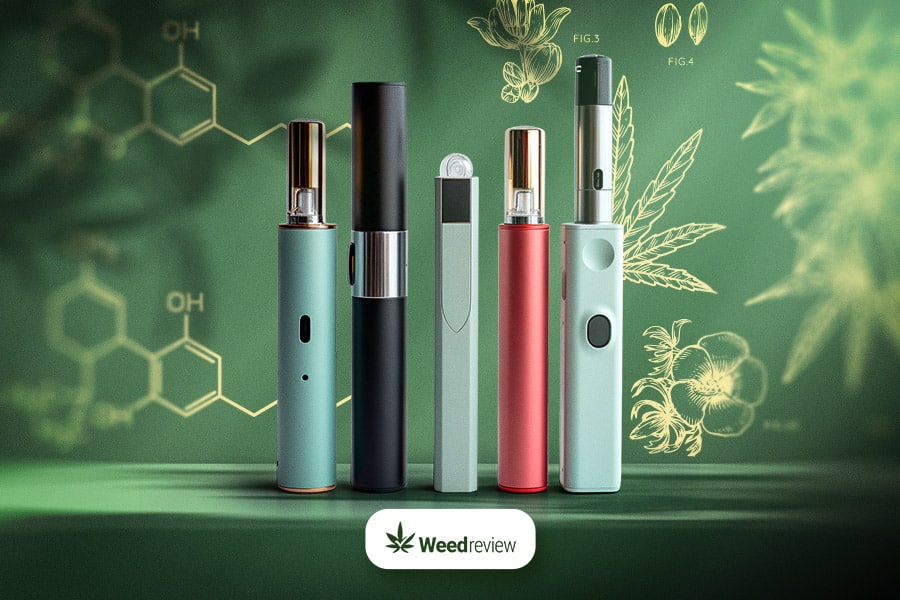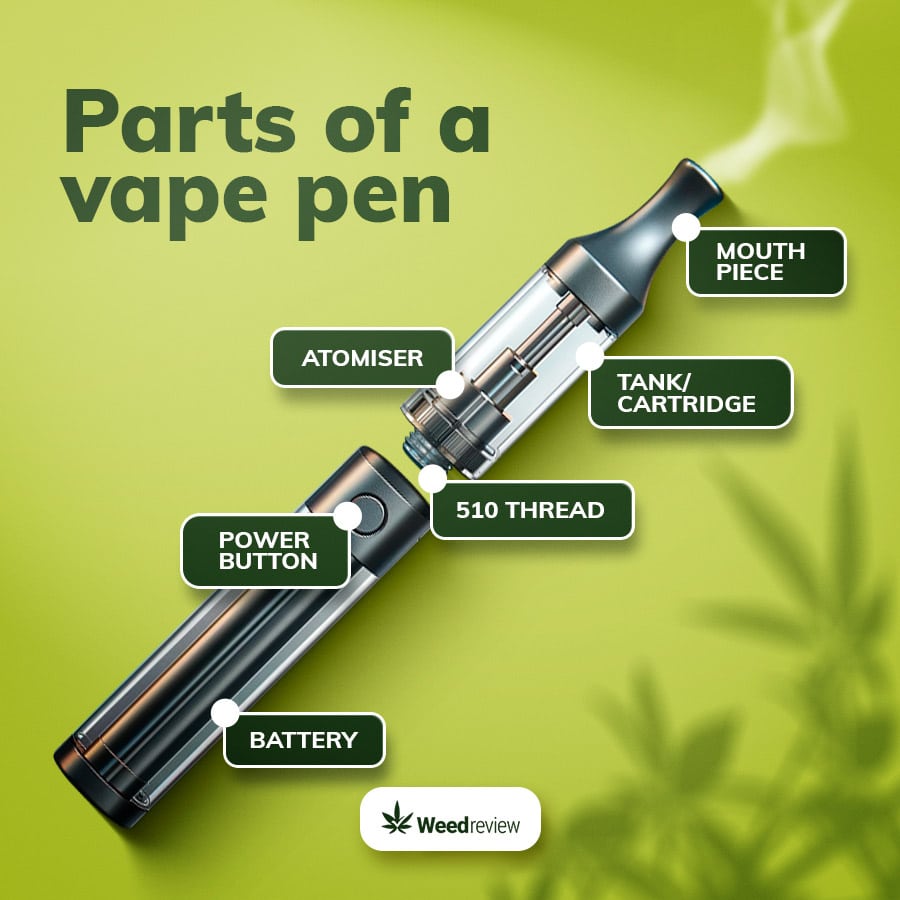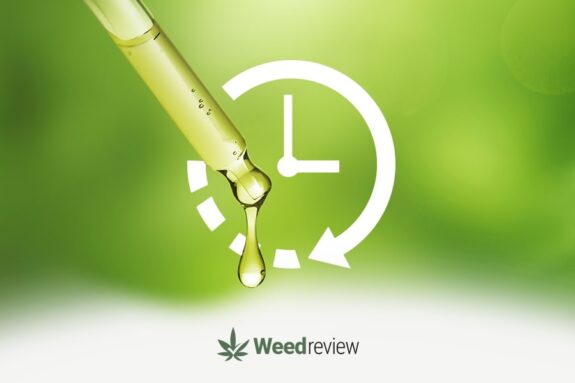
Complete Guide to THC Vape Pens: Usage, Legality, Types, Risks & Safety

Table of Contents
Welcome to our comprehensive guide on THC vape pens. We will look into the mechanics, effects, and legal landscape of THC vaping in Thailand, emphasising user safety and informed decision-making. We’ll examine THC cartridges, disposable and reusable pens, and compare vaping with traditional smoking methods to determine which might be more suitable for you.
As we dive into the details of THC vaping, it’s essential to understand its increasing popularity. In Thailand, a 2023 nationwide survey by the Department of Health Service Support (DHSS) revealed that approximately 1 in 9 young people are now using e-cigarettes.
This upward trend in vaping is not confined to Thailand. In the United States, marijuana vaping has notably surged. The year 2022 marked a record high, with 21% of adults aged 19 to 30 reporting marijuana vape use in the past year. This figure is the highest since the statistic was first recorded in 2017, which was then at 12%.
The increasing popularity of vaping, particularly among younger adults, highlights the critical need for understanding and responsible usage of vape pens. With cannabis now in the picture, this becomes all the more essential.
It is important to note that THC vapes and vaping, in general, are illegal in the Kingdom of Thailand.
As you journey through this article, you will gain insights into using THC vape pens responsibly. We aim to equip you with comprehensive knowledge to navigate the vibrant and evolving world of THC vaping confidently.
What is a THC vape?
A THC vape pen, featuring a universal 510 thread for easy cartridge attachment, is a handheld electronic device designed to vaporise cannabis oil or concentrate. Also known as vape juice or vape liquid, the oil contains the psychoactive compound THC.
THC vapes are also known as marijuana e-cigarettes, weed pens, or weed vapes. These devices provide a smoke-free method to consume cannabis, heating the oil to create vapour without combustion.
THC pens allow for efficient dosing and ‘control’ over your high. They are also discreet, as the vapours do not smell as strongly as other methods of smoking cannabis.
Anatomy of vape pen

A typical THC vape pen consists of a battery, a heating element (known as an atomiser), and a cartridge filled with THC oil.
- Battery: This is the power source of the pen, typically equipped with a 510 thread. It often contains a rechargeable lithium-ion battery, which is durable and long-lasting. Some pens also use single-use batteries.
- Cartridge/tank: Where the cannabis oil/concentrate/THC vape juice is stored. Also known as weed carts, they come in various flavours and strains, offering a broad choice to users.
- Atomizer: The heating element that warms the oil, turning it into vapour. It’s usually made of cotton, ceramic, or quartz for efficient heat retention.
- Mouthpiece: The part through which the user inhales the vapour.
Disposable and reusable vapes

Weed vape pens come in two types – single-use/disposable and reusable.
- Disposable vapes: Convenient and low-maintenance, disposables are used until the liquid runs out and then discarded.
- Reusable vapes: These come with rechargeable batteries and replaceable cartridges. While they require more upkeep, they are more cost-effective and environmentally friendly in the long run.
Some reusable vapes may also have the option to refill them with vape oils instead of replacing the cartridges.
How does it feel after vaping weed oil?
Vaping THC oil often results in a stronger and quicker high compared to smoking. Users typically experience a sense of relaxation and euphoria, with some reporting improved creativity or energy. The high from weed vape pens are also long-lasting and more intense.
These effects vary from person to person, influenced by tolerance, sensitivity to THC, and the specific potency of the oil used.
What is the average price of a marijuana vape pen?
The price range for a THC vape pen can start from 1,000 THB to 1,500 THB for simple disposables. More sophisticated 510 thread reusable pens can go upwards of 1,800 THB to 3,500 THB, excluding the THC vape oil.
Individual THC cartridges can be found for a price of 1,000 to 1,500 THB.
Pros and cons of vaping THC oil
Mentioned here are the major pros and cons of THC vapes.
| Why choose vaping? | Why stay away from vaping? |
|---|---|
| Fewer combustion byproducts compared to traditional smoking. | Potential for EVALI (e-cigarette or vaping use-associated lung injury), other lung issues, and exposure to harmful additives. |
| Quick onset of effects and higher potency of THC. | Increased chance of experiencing paranoia, anxiety, or psychosis. |
| Wide range of flavours and types of concentrates available. | Risks associated with unknown additives in unregulated products. |
| Easy to carry and use on the go. | Possibility of device malfunction or battery issues. |
| Long-lasting effects. | Potential for overuse due to convenience and higher THC levels. |
| Ability to moderate intake more precisely with vaping devices. | Varying laws and regulations across regions. |
| Vaping can maintain the terpene profile and flavour of the oil. | Quality vape pens and oils can be more expensive than traditional forms. |
THC vapes are illegal in Thailand
As per the smoking laws of Thailand, electronic cigarettes or e-cigarettes, vaping devices, and vape pens are banned and illegal in Thailand. This also includes the liquid and refill cartridges used in the devices. The ban was introduced in 2015 – well before the cannabis decriminalisation of 2022.
The same is enforceable in the form of strict punishment – which can include jail time and/or a fine much higher than the value of the vape.
In reality, it is very common to find such products on sale in the country. Since cannabis use was liberalised, THC vape liquids have also hit the shelves in dispensaries – often imported from Western nations.
It is also an everyday sight to see people vape in bars or streets. It is important to note that such products are completely illegal in the Kingdom of Thailand.
If the police catch you, you must pay a large ‘fine.’ Your devices will also be confiscated. Instead, consider other legal cannabis products..
Moreover, marijuana itself comes under the ambit of the cannabis laws of Thailand, which explicitly state that weed in any form cannot be imported or exported from the country without proper permits. For regular travellers, this means carrying vape pens, weed oil cartridges, weed vape juice, or any other cannabis product into the country can land you in serious trouble with the customs.
What is THC vape juice?
THC vape cartridges, also known as weed carts, are filled with marijuana vape liquid that typically includes:
- Cannabinoids like THC, CBD, CBN, CBG, delta-8 THC, etc. It can be a combination of these or an isolate – like THC vape juice or CBD vape juice.
- Terpenes – the naturally aromatic compounds which contribute to the entourage effect.
- Artificial additives like polyethylene glycol (PEG) and medium-chain triglycerides (MCT oil) are sometimes added to thin the liquid, allowing it to vaporise more quickly.
- Flavouring agents are also added to make the vapour taste better.
It should be noted that the oil/concentrate used in vape cartridges is not the same as the ones you use to cook or take orally. Even though these products are advertised as THC vape oil, they should not be confused with THC oils.
Apart from this, the juice can also contain potentially toxic elements and cheap ingredients added by the manufacturer to improve the profitability of the products. The same was also verified in a 2021 study on the constituents of cannabis vape oil liquid published in the Frontiers in Chemistry Journal.
Type of weed carts
Buying THC carts is a lot like buying a concentrate of your favourite cannabis strains. They are marketed under the strain name – like Northern Lights cart, etc., or even under the type – Sativa or Indica.
The dosage will be mentioned in ml and mg, that is, 1 ml of liquid containing 1,000 mg of THC/CBD or 0.5 ml of liquid containing 500 mg of THC/CBD.
Weed cartridges come in the following categories:
Distillate concentrates
Distillate concentrates represent a purified form of cannabis oil containing high concentrations of THC or CBD.
During the distillation process, these oils typically lose most of their terpenes and other natural compounds that make it less viscous.
To achieve the desired consistency for vaping, manufacturers often need to introduce additives to the distillate. Some also add cannabis-derived terpenes to the distillate to make it match the cultivar from which it is made.
CO2 concentrates
CO2 concentrates are produced using a method that uses carbon dioxide to extract the desirable elements of the cannabis plant. This process is unique in its ability to preserve terpenes, retaining much of the original flavour and essence of the plant. The result is a robust and authentic tasting experience when vaped without additional thinning agents.
Live resin
Live resin is a type of cannabis concentrate that is renowned for its high quality and potency. It’s made using a unique process where freshly harvested cannabis is flash-frozen, preserving a robust profile of cannabinoids and terpenes. This method retains the plant’s original flavour and aroma, often resulting in a more vibrant and enjoyable experience.
Full-Spectrum concentrates
Full-spectrum concentrates go a step further, preserving the complete array of compounds found in cannabis. These oils boast not only THC but also CBD, CBN, and a spectrum of other cannabinoids and molecules that collectively contribute to the plant’s therapeutic properties.
Such concentrates closely mimic the cannabis plant’s original flavour nuances, offering a more intricate and satisfying smoking journey. However, due to the complexity of their production, full-spectrum oils are generally pricier and less readily available compared to other types of concentrates.
Is vaping THC juice safer than smoking weed for the body?

Vaping THC is generally viewed as less harmful than smoking because it reduces exposure to the combustion products inherent in traditional smoking. This means you don’t inhale the carcinogens arising from burning the flower.
That said, flowers are considered organic, more natural, and untouched by artificial processes.
Vape oils and cartridges often contain additional chemicals beyond the cannabis concentrate, which can be harmful. In some instances, vaping THC has been deemed more hazardous due to these additives. Here are two notable instances:
- A 2020 study published in the JAMA Network Journal involving over 2,500 young adults found a correlation between vaping cannabis and an increased risk of bronchitis symptoms, with frequent users reporting more wheezing incidents.
- The CDC (Centre for Disease Control, USA) reported that the surge of EVALI cases in 2019 in America, which led to hospitalisations of over 2,500 individuals, was primarily linked to THC vaping products containing vitamin E acetate. This additive was commonly used as a thickening agent in vape oils but has since been eliminated mainly from legal markets due to its association with the illness.
However, other harmful substances likely remain in the carts, especially in unregulated and illicit markets.
Health risks of vaping cannabis oil
When it comes to understanding the risks of vaping weed oil, the high potency of THC is a significant factor.
The concentrated nature of THC in these oils can lead to more pronounced psychoactive and mind-related risks – in addition to the usual side effects of marijuana.
Vaping weed oil is also linked with:
- Paranoia
- Psychosis
- Nausea
- Cannabis hyperemesis syndrome – reported in chronic cannabis users
- Increased heart rate and blood pressure
- Acute respiratory symptoms (cough, chest pain, shortness of breath)
- Respiratory irritation
- Gastrointestinal symptoms (abdominal pain, nausea, vomiting, diarrhoea)
- Constitutional symptoms (fever, chills, weight loss)
- Exposure to toxic and carcinogenic substances in vape juice
- Risk of device malfunction or explosion
- Accidental poisoning in young children
Many of these are partly due to the aerosols that may be inhaled from the devices. Furthermore, as the practice of vaping THC oil is relatively new, research into its long-term health effects is ongoing.
Best practices for safe vaping
To minimize the risks associated with vaping cannabis oil, consider the following best practices:
- Use regulated products: Always purchase vaping products from reputable, legal sources that adhere to safety regulations.
- Check ingredients: Be vigilant about the ingredients in vape oils. Avoid products with harmful additives like vitamin E acetate.
- Start low and go slow: Especially for new users, start with a low dose and increase gradually to avoid overdoing.
- Maintain your device: Regularly clean your vaping device and follow the manufacturer’s guidelines for use and maintenance.
- Stay informed: Keep up-to-date with the latest research and reports on vaping safety and health implications.
- Avoid sharing: Do not share your vaping devices with others to prevent the spread of germs.
- Watch for symptoms: If you experience adverse effects, such as respiratory issues or unusual symptoms, consult your doctor and stop vaping.
Conclusion
Vaping cannabis oil has emerged as a popular alternative to smoking, offering a more potent experience that is long-lasting and powerful. That said, vape products are illegal and banned in Thailand, but they continue to circulate in underground markets.
While vapes may reduce exposure to some harmful combustion products, they are not without risks. The potential for severe health effects, particularly from unregulated products, underscores the importance of caution and informed decision-making. The chemicals and additives added to THC vape oil can undermine your health – especially since there are no quality standards for such products in Thailand.
As such, you may be better off enjoying legal, quality cannabis products like cannabis tinctures, edibles, and flowers.


